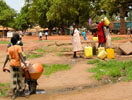
NAIROBI, Kenya—“We wish you peaceful elections next week,” said the receptionist at a hotel in Mombasa, a city on the Kenyan coast. There was a note of concern in his voice as he waved me goodbye that this wish would not come true for Sudan, Kenya’s neighbor to the North.
When I was checking out of the hotel, this receptionist had asked where I was heading home to after my weekend on the Kenyan coast. “Juba,” I said, to which he replied, “Oh no, always bullets there, huh?” Thinking that perhaps he was not current on the situation in southern Sudan, I started to explain that since 2005, there has been peace between the North and South, but as it turned out, he had his own up-to-date information.
“I heard on BBC that [President] Bashir might not let the South have independence,” he said, referring to a widely publicized threat issued by Bashir early last week when tensions were mounting between Bashir’s National Congress Party and the South’s ruling Sudan Peoples’ Liberation Movement over the possible boycott of the nationwide elections by the SPLM and other (mainly northern) opposition parties. Bashir had warned that if the SPLM opted to boycott, his government would not allow the South’s self-determination referendum to take place next January.
On my taxi ride to the airport, the driver was equally concerned that Sudan’s elections would be a cause for the sort of violence his own country witnessed following its elections in December 2007. The taxi driver had visited Sudan last year, when he drove imported trucks from the Mombasa port north across Kenya, into southern Sudan’s Eastern Equatoria state, and on to the southern capital of Juba. He noted that although there are many problems in his own country, southern Sudan is in much worse shape; as we whizzed across a well-paved highway overpass with a passenger footbridge and signs, I was having a similar thought about the stark differences between southern Sudan and its neighbors.
By this time next year, the people of southern Sudan will—if all goes according to plan—have already cast their votes in their referendum. If that poll is free and fair, the resounding choice of southerners will result in the separation of Africa’s largest state and the formation of a new country, southern Sudan.
At this point, diplomats in capitals such as Brussels and Washington have wised up to the need to plan for the likely eventualities of the referendum. Western governments and international institutions such as the United Nations would also be smart to look to Sudan’s neighbors in east Africa for cues.
Ultimately, the people that will be most affected by the break-up of Sudan – aside from the Sudanese themselves of course – are the residents of the countries surrounding Sudan. Conversations like the ones I had en route back to Juba on Sunday remind me of this fact.
Photo: Families collect water in Rumbek. (Maggie Fick/ Enough)

